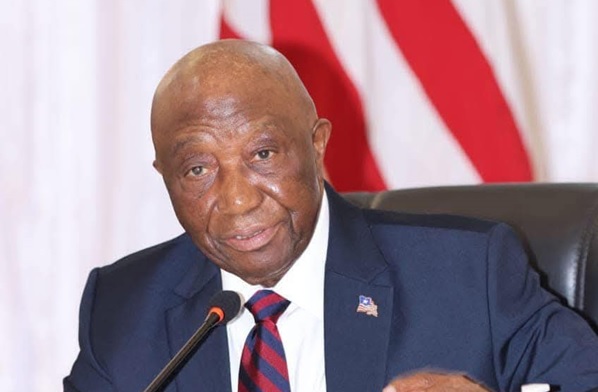MONROVIA, LIBERIA – A controversial resolution by the Liberian Senate recognizing Representative Richard Nagbe Koon as Speaker of the House of Representatives has kindled sharp divisions among lawmakers and raised concerns over adherence to the rule of law.
The decision, announced by Senate Pro Tempore Nyonblee Karnga-Lawrence on Tuesday, December 10, 2024, followed Justice Minister Cllr. Oswald Tweh’s interpretation of a December 6, 2024, Supreme Court ruling. In his legal opinion, requested by President Joseph Nyuma Boakai, Justice Tweh concluded that the majority bloc in the House of Representatives holds constitutional authority to conduct legislative business.
“My reading of the Court’s opinion dictates that the majority members of the House of Representatives meet the constitutional requirements to hold sessions and make decisions consistent with the laws of the country,” Tweh stated during a Ministry of Information press briefing on Tuesday, December 10.
The Senate, following a meeting among its members, adopted Tweh’s opinion and resolved to recognize Koon’s leadership. This move has been hailed by some senators as a step toward resolving legislative gridlock, but it has also drawn significant backlash from critics within the Senate.
Sinoe County Senator Augustine Chea, Chair of the Senate Judiciary Committee and its legal advisor, harshly criticized the Senate’s endorsement of the Justice Minister’s interpretation. Labeling the decision an “attack on the Rule of Law,” Chea expressed his disappointment during an emotional press conference at the Capitol Building.
“It is a sad day for Mama Liberia,” Chea declared, accusing the Senate of undermining democratic principles and disregarding due process. He argued that the Senate should have sought legal guidance from its own Judiciary Committee rather than relying on the Justice Minister, whose role is to advise the Executive Branch.
Chea further revealed that his earlier advice for the Senate to remain neutral and engage both House factions was ignored. He criticized Pro Tempore Karnga-Lawrence for making what he called a “unilateral decision” without thorough deliberation.
“The Senate disregarded the findings of the Special Committee led by Senator Gbezongar Findley, which was tasked with mediating the House dispute. This decision is unsubstantiated by comprehensive analysis,” Chea asserted.
Chea warned that the Senate’s decision sets a dangerous precedent, eroding public trust and undermining Liberia’s democratic framework. He expressed concerns about the alignment with Koon’s bloc on critical legislative matters, including the passage of the national budget.
“This compromises the Senate’s integrity and independence. Democracy must be supported by the rule of law, not circumvented for political convenience,” Chea emphasized.
Margibi County Senator Nathaniel McGill, a stalwart of the opposition Coalition for Democratic Change (CDC), also voiced his opposition to the Senate’s resolution, deepening divisions within the legislative body.
Chea called on his colleagues to reverse the decision and restore the Senate’s neutrality. He stressed that Liberia’s legal framework and international standing could face severe consequences if the Senate continues to prioritize expediency over legality.
“We are undermining law and order,” he warned, urging his fellow senators to uphold their responsibility as impartial lawmakers.
Meanwhile, some political commentators on social media have weighed in on the debate, noting that the resolution has exposed deep divisions within the Liberian Senate and highlighted the challenges of preserving legislative integrity amid political disputes. Whether the Senate will reconsider its decision remains uncertain, but the controversy has certainly brought attention to Liberia’s fragile democratic institutions.







